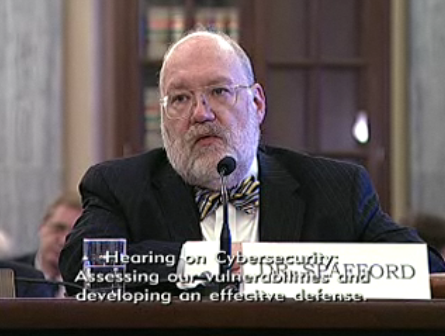Posts tagged education
Page Content
This time, the Senate
On March 19, I had an opportunity to testify before the Senate Committee on on Commerce, Science, and Transportation. The hearing was entitled Cybersecurity -- Assessing Our Vulnerabilities and Developing An Effective Defense.
I was asked to include information on research problems, educational initiatives, and issues regarding the current state of cyber security in the nation. As is usual for such things, the time between the invitation and the due date for written testimony was short. Thus, I didn't have the time to delve deeply into the topic areas, but could only address the things that I already had on hand -- including some posts from this blog that I had written before. The result was a little longer than the other statements, but I think I covered more ground.
One hint for people testifying before Congress on such things: you can't depend on how long you will have for spoken remarks, so be sure any points you want to make are in your written testimony. In this case, the hearing was limited to about 75 minutes because there were several votes scheduled on the Senate floor, and the committee needed to adjourn to allow the Senators to attend the votes. And, as is common for too many hearings, there weren't many of the committee members present; I believe the hearing began with only two of the 25 members present, and some movement of members in and out to reach a maximum of four seated at any one time. In this case, the chair (Senator Jay Rockefeller of West Virginia) apologized to us several times for the low turnout. However, many (all?) of the staff and aides were present, so I'm certain the gist of the testimony presented will be considered.
The Senator made a nice introductory statement.
My written testimony is available on my website as well as the committee site. My oral statement was from rough notes that I modified on the fly as I listened to the other testimony (by Jim Lewis, Eric Weiss and Ed Amoroso). That statement, and the whole hearing, are available via the archived hearing webcast (my remarks start at about 46:30 into the webcast). If I get a transcribed version of those remarks, I will post them along with my written testimony on my website in the "US government" section.
Comments by the other speakers were good overall and I think we collectively covered a lot of ground. The questions from the Senators present indicated that they were listening and knew some of the problems in the area. The comments from Senator Nelson about the intrusions into his systems were surprising: several Senate security staff were present at the hearing and indicated to me that his remarks were the first they had heard of the incidents! So, the hearing apparently set off an incident-response exercise -- separate from responding to my presence in the building, that is. ![]()
Will this hearing make a difference? I don't know. I've been testifying and saying the same things for over a dozen years (this was my 8th Congressional hearing testimony) and things haven't gotten that much better...and may even be worse. Senator Rockefeller has indicated he intends to introduce legislation supporting more funding for students studying cyber security issues. There was some good news coverage of all this (e.g., FCW and CNet).
I am told that there will be more hearings by this committee. Some House committees have been holding hearings too, and the President's 60 day review continues apace. The added attention is great, but with the sudden interest by so many, the result may be more confusion rather than resolution.
Stay tuned.
As a reminder, if you want to know about my occasional postings such as this but don't want to subscribe to the RSS feed, you can subscribe to the mailing list.
Also as a reminder, there is my tumble blog on security issues, with links to items on the news and WWW of possible interest to those who find my ramblings and rants of interest.
A Modest Proposal
Yesterday and today I was reading repeated news stories about the pending bailout—much of it intended to prop up companies with failed business models and incompetent management. Also distressing are the stories of extravagant bonuses for financial managers who are likely responsible for creating some of the same economic mess that is causing so much turmoil in world markets.
Running through my mind was also a re-reading of the recent statement by Norman Augustine before the U.S. House Democratic Steering and Policy Committee (it’s short and a great read—check it out). I definitely resonate with his comments about how we should invest in our technology and research to ensure that our country has a future.
And I was thinking about how can we reward a spirit of honest hard work rather than a sense of entitlement, and avoid putting money into industries where greed and incompetence have led to huge disasters, where those same miscreants are using the full weight of political pressure to try to get huge chunks of bailout money to continue their reign of error.
And all this came together when I saw a story about the lack of medical treatment and high rate of suicides for returning military after extended tours in the battlefield. And then I read this story and this story about the homeless—just two out of many recent stories.
Why can’t we direct a little of our national wealth into a new GI Bill, similar to the original in 1944? Provide money so that our men and women who are returning from honorable service to the country can get the counseling and medical care they need. And then, ship them off to colleges for a degree. If they show real promise and/or have a degree already, then cover a graduate degree.
These are people who volunteered years out of their lives to serve the interests of the rest of us. They were willing to put their lives on the line for us. And some died. And others have suffered severe physical and psychological trauma. They have shown they are able to focus, sacrifice, and work hard. My experience over the last two decades has shown me that most veterans and active-duty military personnel make good students for those reasons.
Service doesn’t provide intellectual ability, certainly, and not all can excel, but I am certain that many (if not most) can do well given the chance. And if regular college isn’t the right fit, then a vocational education program or appropriate apprenticeship should be covered.
Money should be allocated for additional counseling and tutoring for these students, too. They are likely to have a great range of physical and psychological needs than the usual student population, and we should address that. And money will need to be allocated to help provide the facilities to house and teach these students.
While we’re at it, maybe the same should be offered to those who have provided other service, such as in the AmeriCorps or Peace Corps? And perhaps those who take new jobs helping rebuild the nation’s infrastructure. I’m not a politician or economist, so I’m not sure what we should do for details, but the basic idea would be that someone who gives 4 years of service to the country should get 2-4 years of college tuition, fees, room and board.
We might also want structure it so that degrees in the STEM (Science, Technology, Engineering and Math) disciplines have some form of extra preference or encouragement, although we should not discourage any valid course of study—except we should definitely not fund any degrees in finance!
Then maybe give a tax credit to any companies that hire these people after they graduate.
And make this good for anyone who served since, oh, 2001, and for anyone who signs up for one of the covered services before, say, 2015. If those dates don’t make sense, then pick others. But extend it forward to help encourage people to join some of the covered services—they could certainly use more people—and start far enough back.
Yes, I know there are currently educational benefits and health benefits for our veterans, but I am suggesting something more comprehensive for both, and for possibly a larger group. I’m suggesting that we invest in our future by making sure we do our utmost to patch up the injuries suffered in duty to our fellows, give them a shot at a better future. And that better shot is not to turn them out into our cities where there are no jobs, where the homeless live, where drugs and street crime may be rampant.
The whole process would give a huge boost of education to the workforce we want to have for the future. We don’t need more assembly line workers. We need engineers, technologists, scientists and more. Not only will we be educating them, but the endorsement we would be making about the importance of education, and the care for those who serve, will pay back indirectly for decades to come. It worked in the 40s and 50s, and led to huge innovations and a surge in the economy.
Will it all be expensive? Undoubtedly. But I’m guessing it is far less than what is in the budget bills for bank bailouts and propping up failed industrial concerns.
And when it is done, we will have something to show for our investment—far more than simply some rebuilt roads and a re-emergence of predatory lending.
But as I said, I’m not a politician, so what do I know?
Update: I have learned that there is a new GI bill, passed last year, which addresses some of the items I suggested above. Great! It doesn’t cover quite the breadth of what I suggested, and only covers the military. Somehow, I missed this when I did my web search….
Do Open Source Devs Get Web App Security? Does Anybody?
Note: I’ve updated this article after getting some feedback from Alexander Limi.
A colleague of mine who is dealing with Plone, a CMS system built atop Zope, pointed me to a rather disturbing document in the Plone Documentation system, one that I feel is indicative of a much larger problem in the web app dev community.
The first describes a hole (subsequently patched) in Plone that allowed users to upload arbitrary JavaScript. Apparently no input or output filtering was being done. Certainly anyone familiar with XSS attacks can see the potential for stealing cookie data, but the article seems to imply this is simply a spam issue:
Is this a security hole?
No. This is somebody logging in to your site (if you allow them to create their own users) and adding content that can redirect people to a different web site. Your server, site and content security is not compromised in any way. It’s just a slightly more sophisticated version of comment spam. If you open up your site to untrusted users, there will always be a certain risk that people add content that is not approved. It’s annoying, but it’s not a security hole.
Well, yes, actually, it is a security hole. If one can place JavaScript on your site that redirects the user to another page, they can certainly place JavaScript on your site that grabs a user’s cookie data and redirects that to another site. Whether or not they’ll get something useful from the data varies from app to app, of course. What’s worrisome is that it appears as if one of Plone’s founders (the byline on this document is for Alexander Limi, whose user page describes him as “one of Plone’s original founders.”) doesn’t seem to think this is a security issue. After getting feedback from Alexander Limi, it seems clear that he does understand the user-level security implications of the vulnerability, but was trying to make the distinction that there was no security risk to the Plone site itself. Still, the language of the document is (unintentionally) misleading, and it’s very reminiscent of the kinds of misunderstandings and excuses I see all the time in open-source web app development.
The point here is (believe it or not) not to pick on Plone. This is a problem prevalent in most open source development (and in closed source dev, from my experience). People who simply shouldn’t be doing coding are doing the coding—and the implementation and maintenance.
Let’s be blunt: A web developer is not qualified to do the job if he or she does not have a good understanding of web application security concepts and techniques. Leaders of development teams must stop allowing developers who are weak on security techniques to contribute to their products, and managers need to stop hiring candidates who do not demonstrate a solid secure programming background. If they continue to do so, they demonstrate a lack of concern for the safety of their customers.
Educational initiatives must be stepped up to address this, both on the traditional academic level and in continuing education/training programs. Students in web development curriculums at the undergrad level need to be taught the importance of security and effective secure programming techniques. Developers in the workforce today need to have access to materials and programs that will do the same. And the managerial level needs to be brought up to speed on what to look for in the developers they hire, so that under-qualifed and unqualified developers are no longer the norm on most web dev teams.
Useful Awareness Videos
The results are in from the EDUCAUSE Security Task Force’s Computer Security Awareness Video Contest. Topics covered include spyware, phishing, and patching. The winning video, Superhighway Safety, uses a simple running metaphor, a steady beat, and stark visual effects to concisely convey the dangers to online computing as well as the steps one can take to protect his or her computer and personal information.
The videos are available for educational, noncommercial use, provided that each is identified as being a winning entry in the contest. In addition to being great educational/awareness tools, they should serve as inspiration for K-12 schools as well as colleges and universities.
Web App Security - The New Battlefront
Well, we’re all pretty beat from this year’s Symposium, but things went off pretty well. Along with lots of running around to make sure posters showed up and stuff, I was able to give a presentation called Web Application Security - The New Battlefront. People must like ridiculous titles like that, because turnout was pretty good. Anyway, I covered the current trend away from OS attacks/vandalism and towards application attacks for financial gain, which includes web apps. We went over the major types of attacks, and I introduced a brief summary of what I feel needs to be done in the education, tool development, and app auditing areas to improve the rather poor state of affairs. I’ll expand on these topics more in the future, but you can see my slides and watch the video for now:

